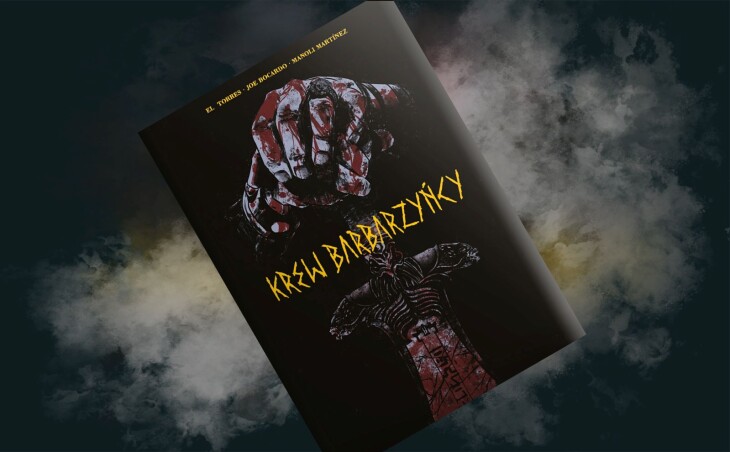This comic was created out of love for Conan, son of Robert E. Howard. As El Torres writes in the afterword, it is the fruit of 45 years of reading books and comics set in Cimmeria or the surrounding area. A pure classic, potentially completely uninteresting for those who don’t know the original.
Conan is Conan, is Conan…
Blood of a Barbarian tells the war story of King Conan’s son, Prince Conan – raised in the image and likeness of his warrior father, continuing the epic wars of the great ruler. Guarantor of freedom and wealth for his people. A descendant of a completely unbarbaric queen. He may not have his own name, but is he just a copy? Don’t we sense the beginnings of a conflict here? An ancient tragedy that must end in massacre?
We guess rightly, and the reason for the tension is given directly at the very beginning of the comic. Delighted with young Conan, his men say “all this is caused by the blood of a barbarian”, while the prince replies: “No. I was educated.” No genes, no upbringing. Culture, not predatory instincts. Responsibility, not adrenaline, drives him to fight.
Translating from Aquilonian to ours, the king’s son is quite skilful, dutiful, and well-trained. Compared to his father, prone to bravado and adventure, he sometimes looks like Artur from Mrożek’s Tango . When the king disappears, the prince goes on a search, not out of family values or fear for his dad, but because the ruler has duties and must be escorted to the throne room. El Torres quite successfully captures the moment when a child must become the parent’s guardian. Perhaps young Conan had already undertaken this mission, which would send the reader to the dark regions of DDP’s psychology. However, it is still a story in the spirit of Howard, we will find here childhood memories, but the most important thing is happening here and now.
A heretic is also a believer
Prince Conan, whether he wants it or not, is a citizen of classic fantasy, but he breaks convention when he can. At some point, the most important character of the comic becomes a seer captured by the Aquitanians during a skirmish with… a more barbaric tribe. It is her story that shapes the path of the army and subsequent cadres. I don’t want to reveal too much, but listen to the main character. His teachings must have included literature, because he successfully mocks the demands of the genre.
And speaking of the genre, on the pages of Blood of a Barbarian we meet the half-naked damsels in distress required in epic fantasy and witches, more independent, sometimes even less clothed. El Torres does not re-read The Cimmerian, he does not break with the classics, and Joe Bocardo draws heroines and heroes as befits fantasy. And yet, they somewhat comment on the reader’s expectations, our certainty that in stories of this type, after the rescue of the lady, a scene comes. The authors love the classics, but they do not pretend that in the meantime nothing has happened in the world of telling heroic epics. You can read this comic as pure, spectacular entertainment, but if you are inspired by reflection, you will also find food for thought here.
The darkness of barbarism
Bocardo and Martinez plunged El Torres’ script into deep darkness. The deeper it is, the more interesting it is, because the colors of the latter bloom when the expressive outline disappears. Perhaps the only truly luminous scenes show Prince Conan naked while bathing. The second moment of visual contrast is the son’s memory of his father dragging him out into a snowstorm. Both of these scenes focus on the prince’s body, his weakness and strength, the first (supposedly) innate. In addition, we see heavy colors in clothes or dark interiors. Group scenes are necessarily sprinkled with gore, sometimes so dark that it must have been shed back in the days of Howard’s original stories.
A tired but victorious barbarian on a pile of defeated enemies – this is a classic image from which neither the authors of Blood of a Barbarian nor their hero can escape. Is it convention or the times that make each Conan decide on serious issues with weapons? The sword, which he then lowers to rest his tormented hands and troubled head on, because his triumphs are sad and temporary… Or maybe it’s not about the warrior’s despair, but about some fundamental lack of difference between rudeness and culture, since both of these attitudes lead the Conans to the aforementioned bloody hill, instead of the peace of home?
This comic book will appeal to fans of Conan in his many incarnations rather than to people who don’t know the originals. The former should be delighted. But even if you’re not a fan of Barbarian, you’ll also find something intriguing here. It is a heroic fantasy in a slightly modern version, which can become a contribution to a conversation about men’s duties and choices. Dreams of freedom or home, so irreconcilable.

